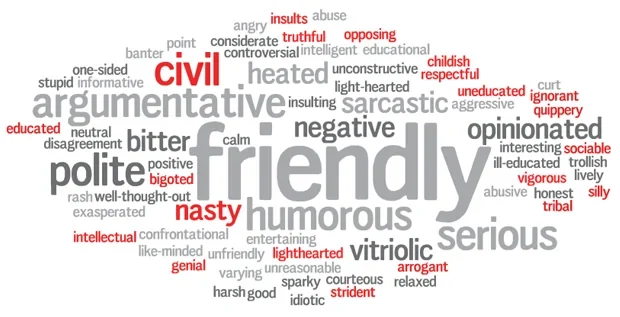Why do you comment online? We ask regular Internet debaters about the who, what and whys of speaking up
Wind back forty years. If you wanted to respond to something you’d read in a newspaper, your option was to write a letter, put it in an envelope, and pop it in the letterbox.
But now there are other kinds of ‘post’.

Today you can write what you think of a newspaper article instantly after you’ve read it by posting your thoughts in the space beneath it. You can articulate your views in your personal blog, and Tweet interesting links for your followers. You can post articles, music, video clips and pictures onto your friends’ Facebook pages.
These online spaces are not only useful for sharing information, but for housing discussion and debate. The use of social networking sites – with Facebook and Twitter at the fore – are now a part of many people’s daily routine, as are conversations on forums or chat rooms for those with shared interests and concerns. Millions of people are finding a voice, forging links to others irrespective of geography, and enjoying the internet as a space for free expression.
In MediaLab, we asked those who make a regular appearance on the internet to tell us what they thought of debating, discussing, and sharing information online.
Do you have an interest, but find Twitter difficult to navigate? Have you yet to try blogging or engage in an online debate or comments piece? Thanks to those of you who both regularly comment on the internet and have shared your views in the MediaLab, we’ve been able to compile a great little introduction to the colourful world of online comment culture for those not feeling so savvy.
Here we present the range of opinion: from what participants felt is the ‘character’ of debate and why they get involved, to some pointers for making the most of it. We also look at their views on what exactly is meant by ‘freedom of speech’.
MEDIALAB ASKED: Which words do you think best describe the TONE of the conversation, comment and debate that you usually see taking place online?
Here’s what MediaLab participants said:

MEDIALAB ASKED: Why do you comment online?
For many of you who comment online, the answer to this question was a simple one: “To express my opinion”. Frequently, MediaLab participants said they “felt strongly” about topics being aired, which is why they enter into a debate or discussion. And across responses, participants gave a variety of reasons as to why they felt sharing opinions online was a worthwhile activity.

- Many said that having an online presence gave them a voice, and enabled them to tap into national debate
- In this vein, some remarked that the internet provides a vital, free forum in which people can express themselves, and share views that they might not otherwise give ‘offline’
- They also liked the feeling of being able to impart their knowledge and wisdom of experience, in a way that might be helpful to other people, or trigger further discussion
- Another set of participants said they liked the camaraderie they’d found in discussions. They enjoyed coming across like-minded people, and forging new on- and off-line friendships brought about by shared interests.
And even if others didn’t share your views, the sense of engaging in a thoughtful and respectful exchange was a real ‘pull’ factor. One participant said they valued being able to communicate over the internet because it stood in for “the social interaction which modern society generally doesn’t have”. And it’s good fun too.
On the other hand, some participants in our research acknowledged they were driven by a need to ‘right wrongs’ in the online debate-sphere.
- Many explained that they speak out in reaction to ‘misinformed’ and ‘misguided’ views; when they feel ‘frustrated’; to represent the other side of an argument where they felt a discussion was too one-sided, or to dispel untruths.
- Speaking from this side of the argument, Davie from Southern England, a MediaLab participant, said: “It is important to allow others to see that you agree or disagree with their views. For evil to exist it only takes good men to stand by and do nothing”, echoing that age-old assertion that “truth” only comes out through discussion; through sensible exchange of beliefs and ideas.
Engaging online can be a learning experience too, which is a big attraction according to a number of participants. Taking part in a lively discussion over the internet quickly introduces you to a myriad of other opinions, can get you challenging and honing your own views, and teach you something about yourself.
To quote another participant:
“The most positive experiences have involved a real exchange of experience – realising something new, or accepting another person's perspective that I had not previously considered. It's rare to change opinions online, but it's very possible to provide and receive new information that could have long-term effects on shaping the other person's view”
THINGS TO WATCH OUT FOR: the not-so favourable traits of being active online
There can be downsides to being vocal, however. Several participants said they’d had a negative response to something they had written. These ranged from people bluntly criticising their opinions over the internet, receiving comments that they felt didn’t really ‘get’ what they were saying, to personal insults and abuse. However, while this is clearly unwelcome, some of you seemed to accept this as ‘part of the deal’ of commenting in an online public way.

As a few general rules and ways to avoid unwanted detractors, here are MediaLab’s ‘Dos & Don’ts’ for taking part in online debate (drawn from participants’ survey answers).

- Share your opinions and take part in internet-based discussions
- Make sure your comments are well thought-out, and that you can back them up
- Try to explain yourself clearly
- Have a thick skin: brace yourself for criticism, but report abusive behaviour
- Know your audience: if you’re worried about who’s reading your comments, stick to online spaces you’re comfortable with

- Make abusive or offensive comments
- Make comments which aren’t relevant to a discussion or are simply to throw off debate
- Make a comment in the public domain you wouldn’t defend face-to-face
- Take the trolls to heart. They are ‘trolls’ after all. You can always report harassment and abusive behaviour
- Hand out personal information
DEBATING THE ISSUES: ‘How do you feel about freedom of speech online’?
It’s hard now to imagine life without the internet as a major influence.
In this MediaLab, participants often said they felt that online platforms had given men and women the means of voicing and exploring their opinions, and an understanding of where they sit in the world.
MediaLab asked participants how they felt about their ‘freedom of speech’ when it came to online comment. These selected responses reflect the wide range of opinion submitted on this subject.
“WE THINK THERE’S TOO MUCH FREEDOM”: Comments on the failings of ‘freedom of speech’ on the internet
“I feel there is too much freedom or not enough regulation. Some of the views go far in being offensive towards other people, whether it is related to appearance, race or background. I do believe freedom to express opinions is important but some needs to be regulated” Anon
“I think everyone has the right to an informed opinion, however I cannot abide armchair experts or those who can only be abusive” RA, Scottish Borders
“Sometimes people write such boring things, it makes me think they have too much freedom” Sian, Birmingham
“Over the internet you are faceless and can't see the person you insult” Richard, Winchester
“The level of freedom should be the same as in the real world” Rhi, Aberystwyth
 “WE THINK IT’S ABOUT RIGHT”: Why some think that ‘freedom of speech’ works online
“WE THINK IT’S ABOUT RIGHT”: Why some think that ‘freedom of speech’ works online
“I think people should have the freedom to comment on most things. Censorship never made anything better” Misco, Crewe
“I think that the internet provides us with very good ways of getting a point of view across and making it visual and public, rather than just shouting at a newspaper or TV screen to no effect at all” Davie, Southern England
“I think it is about right. If someone says something inappropriate then consensus goes against them and they are left to feel in the minority” Alun, Dudley
“I think the level of freedom is just about right, because on some sites you can rate other comments as well as comment yourself” Patrick, Kent
“I think it’s about right. I do approve of (sensible) moderators to keep things on track and polite” Helen, London
“People should be able to voice their opinions freely and it is sometimes only through discussion/debate that a difference can be made” Paul, UK
“There are no special rules for the internet, and that position is about right. You can say anything that isn't defamatory or an incitement to a crime” Anon
 “WE THINK THERE IS TOO LITTLE”: Why participants said ‘freedom of speech’ online needs to grow
“WE THINK THERE IS TOO LITTLE”: Why participants said ‘freedom of speech’ online needs to grow
“I don't think you can have enough freedom online. I feel as though the online community is the most free-thinking form of media and always will be” Brad, Brighton
“I find the existence of super injunctions, particularly to cover up sex scandal trivia, outrageous. If something is true, I believe people should have the right to say it (with a few rare exemptions relating to children and medical matters)” Sturdy Alex
“There isn't enough freedom in the world and British freedom of speech must be protected from government and the police (see trial for that Twitter user who was clearly joking about bombing an airport over delays)” Anon, Nottingham
“The freedom should be almost total. People should have the same freedom to say anything that they would have if they were, for example, having a conversation in a restaurant. There should be almost no constraint on that debate up to the point that it crosses into actively advocating illegal activity” Anon
“I sometimes feel that debates or comments on sensitive subjects or taboo subjects are too heavily moderated. Offensive or racial comments I understand have to be removed. But one-sided opinions or ideas and beliefs are not always allowed to be expressed freely” Anon, Sheffield
“If anything I think people are still too reserved when it comes to stating their opinions” Mr T, Hampshire
DISQUS DEBATE
Do you think we have too much, too little, or just enough freedom of expression online in the UK?
Do you feel your opinions matter? In your view, what is the Good, the Bad and the Ugly of internet comment culture? Please answer below…










